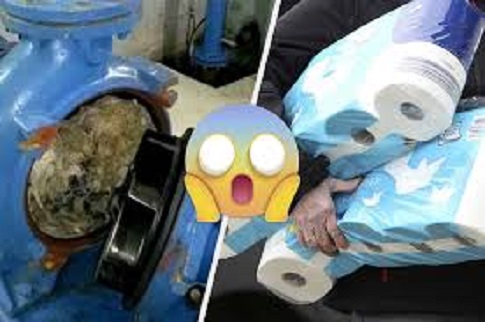Australia’s obsession with toilet paper hoarding due to the coronavirus pandemic has led to a new problem for wastewater authorities after it was revealed that there has been an increase in blockages because people resorted to alternatives.
There has been a shortage of toilet paper across Australia largely due to panic-buying and hoarding.
It has even led to fights and attacks, with officials failing to placate consumers.
Most stores have imposed purchase limits.
The toilet paper fiasco is now blamed for an increase in “fatbergs” blocking the wastewater system in Sydney.
State authority Sydney Water said Wednesday it recorded a 22 per cent increase in sewage blockages in March, “caused due to a rise in alternatives, such as non-flushable wet wipes and tissues, being disposed of down the toilet.”
“The increase follows weeks of sustained shortages of toilet paper in supermarkets amid Covid-19,” Sydney Waters told dpa in a statement.
ALSO READ:COVID-19: LG fumigates markets, public places in Lagos
Darren Cash, a customer manager at Sydney Water, said they were “concerned” as the build-up of wet wipes, facial tissues and paper towels along with fats, oils and grease which people pour down the drain have resulted in blockages, also known as “fatbergs.”
It can result in overflows into local waterways and homes, he said.
Cash also said wet wipes do not break down even though they might state they are flushable, while facial tissues also do not break down, even though they might be made from fine materials.
“If people are forced to use alternatives to toilet paper they should dispose of it in the bin,” he said.
Sydney Water estimates that about 75 per cent of wastewater blockages involve flushable wet wipes.
It also found that an estimated 1 in 4 people in Sydney flush wet wipes and about three-quarter of people who flush wet wipes are unsure or think they are biodegradable.
Last year, authorities spent more than 8 million dollars (4.8 million U.S. dollars) to remove some 500 tonnes of flushed wet wipes from the wastewater system.
It comes from state coffers and the figure is growing, Sydney Water said.
Cash said individual homeowners could also bear a huge financial toll in expensive plumbing bills due to such irresponsible flushing.
“One Sydney resident had a plumbing bill of $16,000 to repair a problem caused by flushing wet wipes,” Cash added.
Sydney Water told dpa they are using social media and other channels to reinforce that “people should only flush the three Ps – pee, poo and (toilet) paper.”
But the problem is not just specific to Australia.
In the U.S., a local city council in California had to issue a public service campaign last week after residents began flushing strips of shredded t-shirts they were using as toilet paper.
In October, it took three weeks for London council workers to clear a 40-ton bus-sized fatberg, made of fat, grease, wet wipes, and other materials from a Thames River sewer after it was clogged up.
Last month, Thames Water, Britains’s biggest water and wastewater service, warned consumers not to “feed” the “fatbergs”.

Leave a Reply